#executioner
Explore tagged Tumblr posts
Text
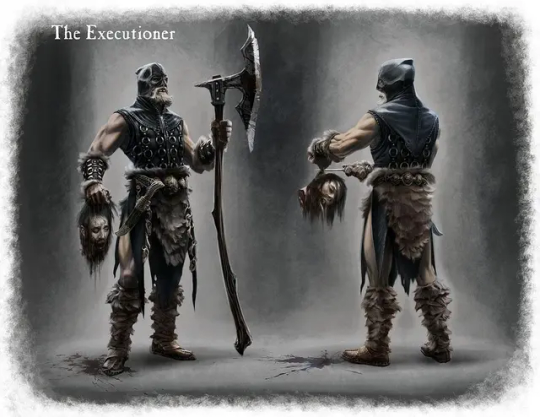
The Executioner
Concept art for The Elder Scrolls V: Skyrim
Art by Ray Lederer
29 notes
·
View notes
Text

Noelia Towers (Catalan/American, 1992) - Untitled (n.d.)
390 notes
·
View notes
Text

“When Strength Wields the Blade of Liberty”
25 notes
·
View notes
Text

327 notes
·
View notes
Note
Hello, I was curious if you have any information on writing a character that is an executioner. Specifically in the medieval times and if they were the royal/town executioner. Their role, anonymity vs. Being known, their livelihood, etc.
Writing Notes: Medieval Executioner

The duties expected of and performed by executioners, as well as what life was like for specific executioners, has varied wildly across time and regions.
How One Became an Executioner
Often, they were more a race of outcasts than a profession.
Many European Medieval executioners were former criminals.
The role of executioner was so unpopular that finding someone to do the job often required either forcing someone into the profession or
offering the gig to someone who was slated to be executed themselves.
In Germany, while “standing executioners on salary were the norm” throughout Germany during the 1600s, for many centuries prior to this it was commonplace to thrust the role of executioner upon a victim’s oldest male relative.
Scandinavian countries were known to make extensive use of this novel hiring practice, with a little twist thrown in - they’d maim executioners by cutting off one or both of their ears so that they could be easily identified by the public. It also wasn’t uncommon for people made executioners in this way to be branded somewhere on their head.
Negatives
Suffered profound prejudice and
ostracism, and consequently married largely within the executioner community. Due to the infamy attached to the profession, some families of executioners were essentially forced into interbreeding and sometimes even inbreeding (such as in France).
Being damned in the afterlife was the general consensus. This was despite the fact that in some regions, such as France, executioners were by official church decree absolved of the sins committed while performing their duties.
This still didn’t stop the general public from considering executioners unclean.
Often denied citizenship to the towns and cities they served (and thus had few rights in the town).
Largely barred from holding office or even entering churches, pubs, bathhouses, etc - basically most public establishments were off limits to the executioner.
Risk of being killed either by vengeful relatives or the crowd witnessing an execution. In regards to the latter, if an executioner was especially cruel in their meting out of punishment, simply incompetent to the point that they caused undue suffering, or just otherwise acted in an unprofessional manner in performing their duties, it wasn’t unheard of for a crowd to retaliate by killing the executioner on the spot, generally with no consequence to anyone in the mob.
Positives
They nevertheless possessed extraordinary privileges such as havage, a kind of tax that gave them the right to take a portion of food and drink from market vendors for free. This entitled them to seize a percentage of goods from every vendor in the marketplace with a tin spoon (so as not to subject the remaining produce to contamination).
They also collected tribute from their fellow pariahs, lepers and prostitutes.
They led lives of significant material comfort and privilege though reviled in every aspect of their daily life, particularly those from France's largest cities.
Customary for whatever property was worn at the time of death to be granted to the executioner throughout much of Medieval Europe.
Living Conditions
Throughout Medieval Europe, executioners were often forced to live in houses outside of the city or town they plied their trade in. In cases where this wasn’t possible, they tended to live near things like public latrines, lepertoriums, or brothels.
Paradoxically generally forced to live apart from that civilised society despite executioners being deemed critical for a society to remain civilised.
Common Types of Medieval Execution Methods
Beheading - One of the most honourable and least painful way to be executed in the Middle Ages. If a sharp enough axe was used, a person could be decapitated with one swift blow, allowing for an instantaneous death. Because of this, beheadings were often reserved for nobles, knights even royalty.
Boiling to Death - Usually reserved for poisoners, coin forgers and counterfeiters. It involved being flung into a cauldron of boiling water or oil and the accused would slowly scald to death.
Burning - To be "burned at the stake" was a common type of execution and was often given to people believed to be heretics or witches. Strapped onto a wooden stake and surrounded by branches, these were then lit and would slowly burn alive.
Crucifixion - Harking back to biblical times, crucifixion was also carried out throughout Medieval Europe. Crucifixion is to nail a person to a cross with their hands and feet and leave them there until they die. A very prolonged and of course painful way to die, it can take days and even up to a week for death to occur.
Crushing - Used both as torture and for execution, Medieval crushing involved placing the accused's head in a device that slowly crushed the top and sides of the head together. Eventually the eyes would pop out, skull would crack and the neck would break.
Hanging - One of the most well known forms of execution, traditional hanging was still very commonplace in the Middle Ages. Someone could be hung for various reasons, from the petty thief to an esteemed Nobleman. When hung with a trap door the neck would break allowing for a quick death but simply being hung could take minutes (sometimes longer) to die.
Hung, Strung and Quartered - Perhaps the most brutal of all execution methods. This was traditionally given to anyone found guilty of high treason. The culprit would be hung and just seconds before death released then disemboweled and their organs were then thrown into a fire - all while still alive. Once dead, they would then be cut into four pieces and traditionally have their body parts sent to four different parts of a city as a public warning to others.
Impalement - To be impaled (or stuck through) a large sharp object, such as a metal spear or pole and left to die. This corporal punishment was regarded as one of the most shocking public form of executions and was often given to suspected witches, women found guilty of infanticide and child molesters.
Sawing - The victim would be hung upside down and slowly sawn in half. If sawn all the way, they would die, but often the victim was only sawn up to the stomach and left to die, which could potentially take several days.
The Wheel - Or Catherine Wheel, involved the victim’s limbs being gradually broken while strapped onto a wheel and then left to die. Agonising, this form of execution could take days for the victim to die.
Other Jobs
For most, there simply weren’t enough executions to make ends meet. Alternate work was limited to jobs nobody else wanted. This included:
disposal of corpses (animal and human),
emptying cesspools,
collecting taxes from the diseased and prostitutes, etc.
Another common profession for a well trained executioner was that of a doctor and surgeon.
Beyond executing people, another thing executioners were often called to do was torture people for various reasons.
These two things, combined with the close-knit community of executioners sharing their knowledge amongst themselves, resulted in lifelong executioners generally having exceptional knowledge of human anatomy, and thus they were commonly called on to treat various medical maladies.
They earned extra money in the form of bribes from the condemned or their families.
It was invariably given in the hopes that the executioner would ensure death was as swift and painless as possible, or otherwise allow the condemned extra comforts leading up to the execution.
This might include, for example, slipping them extra alcohol or the like to make the execution a little easier to handle.
Executioners in Germany were frequently tasked with things like arbitrating disputes between prostitutes and driving lepers out of town, among other such jobs, all of which they could charge a premium for because nobody else was willing to do the job.
As a Character Trope
The portrayal of The Executioner in literature and other media
Someone tasked with killing prisoners or criminals sentenced to death by an official authority.
In some cases this person could also execute other corporal sentences such as whipping or chopping off limbs.
Subtypes
Alienated: Given their rapport with death, especially with death violently and voluntarily given, and even though they were nominally agents of justice, they were often shunned by the public. For this reason, they often appear masked.
Dynastic: The above factor oftentimes led to dynasties of executioners, since no one would give them relatives to marry and their children were often banned from doing other work, or training.
Tormented: They might be depicted as suffering anxiety due to them causing the death of other human beings or because of a particular convict they befriended, fell in love with or were convinced of their innocence.
Psychopath: Contrarily to the above factor, some might be depicted as bloodthirsty who enjoy the opportunity to kill people legally.
Professional: In a more moderate version of the above factor, others might be proud of their work, which they see as essential for a society.
Apathetic: Became stone-hearted because of their work.
Incompetent: Really bad at their jobs by being clueless, clumsy, and would likely botch the job even when successful.
Several subtypes could fit for each example.
Examples
In the year 1470, a poor thief stood at the foot of the gallows in the Swedish town Arboga and was waiting to be hanged. The public attending the spectacle had pity on the sinner and when he, to save his neck, offered to become executioner in the town, it was agreed. He was pardoned and the red-hot iron was used to brand his body with both thief and executioner mark.
The representation of executioners wearing hoods supposedly comes from the execution of Charles I of Britain, as no one wanted to be identified as the regicide.
The grand spectacle of capital punishment birthed an entirely new class in medieval France, bound by duty and blood. The executioner patrolled society’s margins and held court in the town square, where he “coaxed the meaning from the flesh of the condemned.” Executioners were both feared and reviled by the public, who they came into contact with only when carrying out their duties. From the early 13th century through the reformation of the penal code in 1791, the executioners of France lived a life apart, their clothing marked and their families ostracized.
Sources: 1 2 3 4 5 6 7 ⚜ More: Notes ⚜ Writing Resources PDFs
Hi, here are some information I found for you. There were many interesting details and examples I wasn't able to include, so you can find more in the sources above. Hope this helps with your writing!
#anonymous#medieval#character development#executioner#writeblr#writing reference#literature#dark academia#tropes#writers on tumblr#spilled ink#writing prompt#history#creative writing#writing inspiration#writing ideas#writing resources
62 notes
·
View notes
Text

On Friday, you can be judge, jury, and executioner of your own destiny!!! Good Morning!!!
#morning#good morning#good morning message#good morning image#good morning man#the good morning man#the entire morning#gif#gm#tgmm#molotov cocktail#tgmm friday#☀️🧙🏼♂️✌🏼#judge#judge judy#jury#executioner#judge jury and executioner#law#laws#no rules#no rules or laws#friday#happy friday#friday vibes#verdict#anything goes#disco ball#fire
163 notes
·
View notes
Text
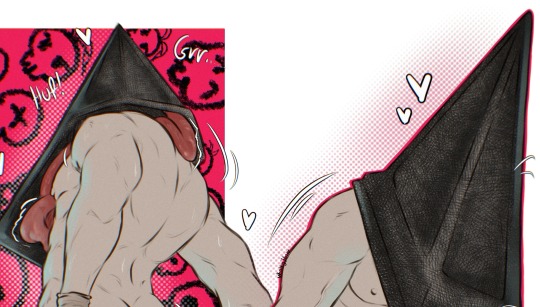
My hand slipped 😭
PATREON | TWITTER
175 notes
·
View notes
Text
Just had this idea. Definitely going into my fic.
The ghost flew at Phantom. Danny blocked the ghost's reaching hands with the flat of his sword, his layered cape of stars flaring out in an unseen wind.
"Oh," the ghost mocked with an ugly grin, "Are you gonna hit me with your sword? What's that going to do, KILL ME?!" Their voice was deranged.
"No," Phantom denied, "that's not how your story will end." He pushed the ghost back, even for someone haunting their own corpse their breath was rancid.
The ghost cackled. "You're a writer now how Fun!" Spit landed on Phantom's cheek. "How does my story end huh? Gonna write it on the walls with that toothpick!" They fell into deranged laughter.
Phantom kicked the ghost's stomach, sending them flying across the warehouse and slamm into the wall. Cracks framing the ghost's corpse.
Phantom let his sword drag along the concrete as he walked. "Don't mistake my sword for a pen." Phantom stood tall, his voice melding with the scrape of his sword. "A sword can't write poetry, just as a pen can't win battles." Phantom was half way across the warehouse now. The ghost just sat there grinning. "Mighty is the one who knows when to pick up the sword and when to wield the pen." Phantom stoped, now standing above the ghost.
The ghost leaned toward Phantom, his broken neck falling forward as he moved his arms in a bow. "Then fel me with your sword. If you must." The ghost chuckled.
Phantom raised his sword. "I'm writing poetry." Then he sheathed it.
"WHAT!" The ghost shouted angrily.
"RED HOOD!"
○○○○○○○
Across the city Jason heard the King's call.
#dpxdc#dp x dc#Ghost King Danny#Judge#Jury#Executioner#Ghost is a mystery person yall will probably quess#Waffles#because my friend wanted me to put waffles in this post
100 notes
·
View notes
Photo
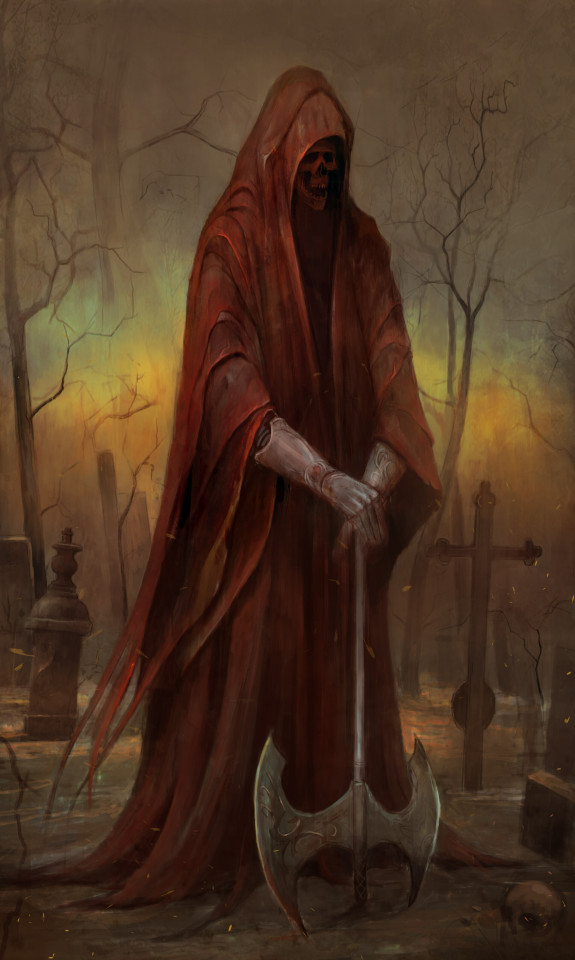
Executioner - Leszek Woźniak
203 notes
·
View notes
Text
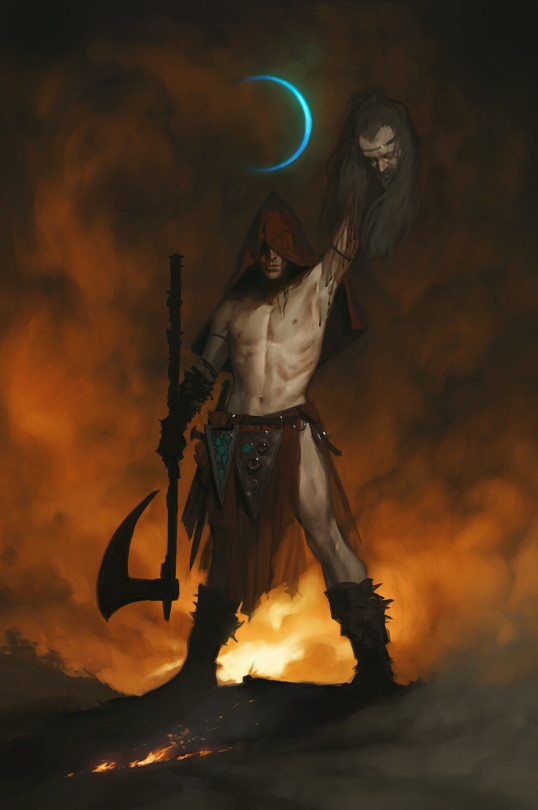
Executioner by Jodie Muir
252 notes
·
View notes
Text

Immortal Thor #21 (Marvel, March 2025) variant cover by Pete Woods
#immortal thor#comics#comic books#cover art#variant covers#comic covers#marvel#thor#executioner#pete woods
46 notes
·
View notes
Text

#honkai star rail#hsr#artists on tumblr#art#fanart#digital art#gepard landau#serval landau#lynx landau#eXecutioner
288 notes
·
View notes
Text
pulling more yaoi out of our asses i see
this is VERY vague it is heavily advised you read the context paragraph before reading the actual story
context paragraph below
༉‧₊˚.
Succinctly, Dark Cacao is an immortal executioner and Pure Vanilla is a religious figure to be executed. Dark Cacao is drawn to him cause they’re destined (or doomed) to be together in every universe cause I said so and it dredges up memories of the past of when he had to execute his own son (we all know who that tragic little fucker is) in order to prove he was worthy. Everything else is ambiguous. Is Pure Vanilla truly the son of God in this? It’s up to interpretation. Certainly not my best work but alas.
.・。.・゜✭・.・✫・゜・。.
Does the executioner feel the weight of his axe? Does the shame of taking lives prey on his conscience, or is that precisely what fuels his ambition, what pushes him to drive his axe through the defenceless necks of the innocent?
Innocent or guilty, the executioner kills nonetheless. To him, it is an art. To be the anonymous deliverer of justice, to be the one to topple supreme men, to bring them to their knees and silence their mewling cries for ‘justice’.
Justice. Folly.
Render them indistinguishable from a rotting peasant on streets lined with filth.
Lift their severed heads to crowds below, who will either fall to their knees, and whose laments will be heard from dawn to dusk, or roar in patriotic victory, celebrate the satiation of their blood-lust. To know, that he, he brought about this fateful reckoning, and, oh how the people scorn him. But how they adore him too, with his silent neutrality. Some demand that he rebel, indignant at the death of a saint or a well-loved king.
Yet he is death incarnate. Death falters before No man nor king.
There was something holy about the way his presence compelled the mob into silence. They waited, wide eyed with bated breath. These were people who knew that Death haunted the hallowed grounds upon which they clustered. They all understood, however, that this was more than death. It was a sacred ritual, a purging of sin and a precedent to the era of purity. Which, inevitably, would soon be broken, for another sinner would be chosen and led to death. Depending on who it was, reactions varied from blinding fury to burning euphoria. Nevertheless, the words and decisions of the Church could never be absolved, at least not by something so insignificant as the lower-class.
Conforming to the endless cycle of the death of nighttime and the rebirth of day, the sun rose once more to take its place at the pinnacle of the sky.
The executioner knew that he too, was subject to a kind of cycle, however inconsistent. The cycle of execution.
It didn’t happen every day. No matter how sanctimonious the heads of the Church’s order were, even they knew constant slaughter would eventually lose its gravity, if done before the public too many times.
Today, though, it would happen.
He did not need to steel himself. He was silent as he ascended the wooden steps to the platform where the chopping block, marred with the blood of uncountable past peoples, waited. If anyone were to strip him of his mask and the hood casting shadows over his face, they would find features so eerily stoic, it was as though they were a waxen mask and not skin.
Those who did not cast their eyes to the heavens in hopes of divine intervention scrutinised him, blatantly staring as he proceeded higher and higher.
Did any of them notice that the instrument of murder on his back was held in place by his hands and not straps? Did they see him buckle slightly under it’s weight, hear the sigh escape his lips as it was dropped into the wood atop the platform?
They did not, for at this moment in time they had changed the subject of their attention and were now gazing expectantly at the double doors, for the execution site was adjacent to a great cathedral, which would open and reveal the traitor. After some time, open they did, albeit laboriously.
Based on the way cries of gratitude penetrated the silence, this was someone whose death instilled relief.
Maybe it was the fact that it was the first execution in a long time, but he found himself turning his head to watch the doors of the church. The victims were prayed for. Blessed with holy water, so that in death they could be what they were not—pure.
Yet the man who stepped out into the sunshine looked like a martyr. Painfully beautiful. His flaxen hair fell down to his back, obscuring the sides of his face as his head was bowed. A graceful form, interlocked fingers.
The innocence of a lamb. Already purer than holy water could make a person. He felt strange. Drawn to him, somehow.
Unlike his hundreds of predecessors, who were stripped of their finery and forced into rags, wisps of white cloth fluttered from his robed frame. He seemed to radiate compassion and glory. Was he a priest, as his attire suggested? That was likely why he didn’t wear a blindfold.
When the two guards flanking him pushed him forwards, and he tripped, groping at air, the executioner realised he was blind. The guards stood back.
Somehow, to his deep shame, he found himself stepping forward. Before hundreds of people, who watched so intently that No detail would be missed, he stepped forward to allow the blind man a place to grip on to.
Through the slits of his mask, he saw one of the two guards tense, but remained staring impassively into the crowd.
He understood that. It was not his place to interact in any way with whomever was to die that day, and he had never done so. Let the victim writhe and flail. His intervention was needed the second heads were brought to the block, No sooner.
Only it seemed that philosophy had crumbled in a mere moment, a moment of devotion.
As he took in the figure holding onto him, he was surprised to see eyes of contrasting shades blink at him. One was a shatteringly clear blue, the other as soft and as golden as the sun. Were they really boring into his own, or was he getting paranoid?
Of course they weren’t. But that didn’t help shake the feeling that his layers of black cloth were pierced.
When the man turned his face up, he saw a row of harsh red scars peeking out from under his blonde hair, angry against his smooth tanned skin. The miniature slashes seemed to travel all around his forehead, and it sparked an unfamiliar curiosity in regard to what exactly they did within the walls of that church.
He shifted, trying to get a better look at the almost-angel who clung like a lover to his over-garment. To his dismay, he felt him loosen his hold. He must have taken his movement as an indicator of wanting to be released, but it was the furthest thing from. He was still in awe, so he did not speak.
From where he looked down at the man, the holes at the centre of each of his palms were evident, ringed with dried blood.
“Oh, I do apologise,” the man said breathlessly, unbunching the folds of clothing wrapped in his fist.
No response came, but it was not for the sole reason of disagreeability, but rather that the powerful executioner found himself entranced by whoever this man was. Something tightened in his chest in that second when he clutched the front of his cloak, his touch was soft, his movements gentle even minutes away from death. And when he spoke—oh his voice. The desire to hear it again, even if just for a second, was absolute. Four words had floated past his lips, yet they seemed to quiver and tremble with soft, inconceivable melodies laced tightly into each syllable, filling him with an ecstasy he thought had been ground into apathy by time. Even the way the clothes he donned shifted and shimmered in the spring sun as though a celestial seamstress had plucked shafts of light from the heart of the sun itself, and draped them around a mortal, was captivating, such grace and elegance were unmatched.
A growing sense of airy detachment diffused into the air on the platform, and the executioner felt his grip on the axe loosen as his hands grew weak. He feared he would not survive those last words, as he watched the man kneel and clasp his hands together, almost in prayer. Anticipation, for such last words, filled the atmosphere. Silence, however, draped over them all for a tantalising few minutes.
When he opened his mouth to speak, the executioner realised he ached with longing.
“Father, forgive them. For they are lost without your righteous hand to guide them, and they do not know what they do.” With unseeing eyes, he turned to the man he had clung to before. “Know that your bloodstained hands, too, are sacred.”
This man—No, this paragon of righteousness could not be speaking to him. He the unholy temple in which raw sin resided, a thing disgusting and dirtied. Never worthy of the promises, let alone the attention, of a martyr. That voice, those words were the ambrosia he wanted to gorge on, drunken himself through means of and cloud his mind entirely with.
All he could do was watch as the man whose words ensnared his mind parted the flowing currents of gold on his head to reveal a smooth nape, and rested his neck onto the piece of wood.
He knew what he had to do now. What his purpose was, what his sole reason for existence was. Relinquish the Earth of life, spread his essence everywhere like a plague.
So why did the axe weigh heavy in his hands? Why did the alien feeling of guilt begin to fester within him?
Still, he strode to the kneeling man. Still, he raised the axe high above his head, the arising assent of the villeins below burning into his ears. Every ounce of his heart seemed to rail at him to throw the axe down, to grab the punctured hand of the priest and flee. But his brain prevailed, calling him to carve the cutting edge through tender flesh.
Nothing else existed anymore. Only the way in which the instrument of death sliced through the air, heard by all in the reverent silence. The obscene noise that sounded when metal met skin.
Instantaneously, shrieks and calls disrupted the silence, jostling and fists thrown into the air shattered the previously dominant stillness. Songs were uplifted from the people and thrown into the sky, into the ears of anyone who acknowledged it.
The executioner heard none of this. The only thing audible to him was the whistle of the axe as he—him, his abhorrent hands—carried it through the air, and brought it down mercilessly upon a saint. He was numb as he bent down to grip the severed head, sick with shame as he looked upon the bloodstained finery. Blood that stained his hands. Blood that he shed.
As he brandished it for all to see, he was faint with disgust, questioning how he had done this for years and felt nothing almost every time, yet now, because of a few words, he wanted to discard his mantle. Brazenly displaying the head of such a beautiful soul in this manner was deplorable. He was beginning to understand the resent many held for him, as it grew in his own conscience too.
Behind him, he heard the guards shifting, and took this as a sign to drop the head. Strangely, even though he despised how crude it all was, if he were permitted to have it in his own care, away from the primitive perceptions of others and for him alone, he would not mind keeping it. Those eyes, though glazed, were still the most beautiful pair he had ever seen, and he knew this slaughter would haunt him in the way only one other death did.
Unbidden, a face rose up in his mind.
Trying to suppress the memories when they rose up was a useless thing to try. They came in an organised sequence, one hellish recollection after the other, the same every infrequent time.
The rain that pelted Earth on that fateful day, the straggling few, the confusion of seeing a child of his own visage at the grounds of death, dark, short hair disturbed by white, brown skin so like his own, shining with rainwater.
He turned his back on the scene.
Those eyes, sanguine and terrified—
He walked briskly down the steps, entering through the pathway to take him to the catacombs beneath the cathedral.
The desperate thrashing, the cries for help—
He began to run, discarding his axe and fleeing through the winding tunnels.
Father! Father!
He stopped. He stopped running and crumpled to his knees, letting the ghost of those aggrieved screams fill his head and the memory of realising that this was the heavy toll to be extracted in order to prove that he could kill with No remorse choke him. Since then, he had promised never to let his feelings affect him, and his executions had been flawless and smooth.
Today though, today was different. He would weep today, his sobs tainted with loathing at his own vulnerability.
He told himself another day would dawn. Another death. He will have composed himself by then, for he cannot afford to be weak. Not before a single living soul. He was not human. Only the executioner.
Hours passed. Nobody came to hold the executioner close, because to them, that is all he is. A marionette only brought out when nobody is willing to get their hands dirty. He is the one who bears their sins, for he is disposable. They blacken him to preserve the goodness of their precious church. Even so, those in power would never truly understand how deeply he has been damaged. And he too, will never truly understand that either, until ruinous moments like these come about.
But he will never forget the man who seemed to see his sacrilege entirely. Who, in spite of it, pronounced him pure.
Who he laid waste to, regardless.
#cookie run kingdom#purecacao#crk#dark cacao cookie#pure vanilla cookie#executioner#executed#executionerxexecuted#dark cacao crk#cr kingdom#pure vanilla crk#purecacao crk#purecacao fic#old man yaoi#yaoi#doomed yaoi#probably
41 notes
·
View notes
Text
EXECUTIONER
by Denis Zhbankov

#tentacles#fhtagn#denis zhbankov#concept art#chara design#creature#monster#horror#dark fantasy#black and white#warrior#demon#hell#runes#horns#executioner#fhtagnnn
139 notes
·
View notes
Text

#illustration#webcomic#cartoon#comic#comicstrip#newyorkercartoonist#comics#funny#medieval#executioner
17 notes
·
View notes
Text
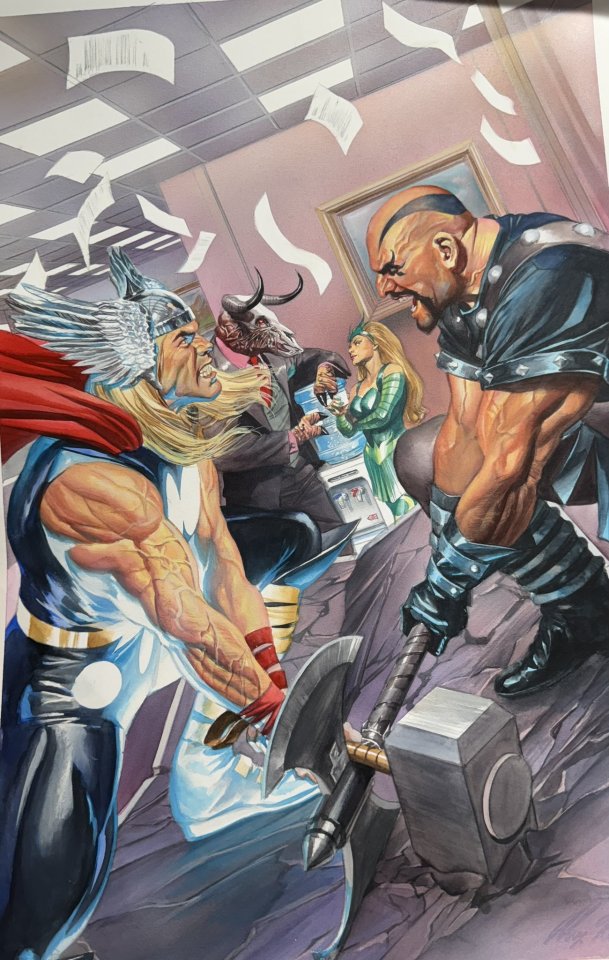
Immortal Thor 10 (2023) by Al Ewing & & Martin Coccolo
Cover: Alex Ross
93 notes
·
View notes